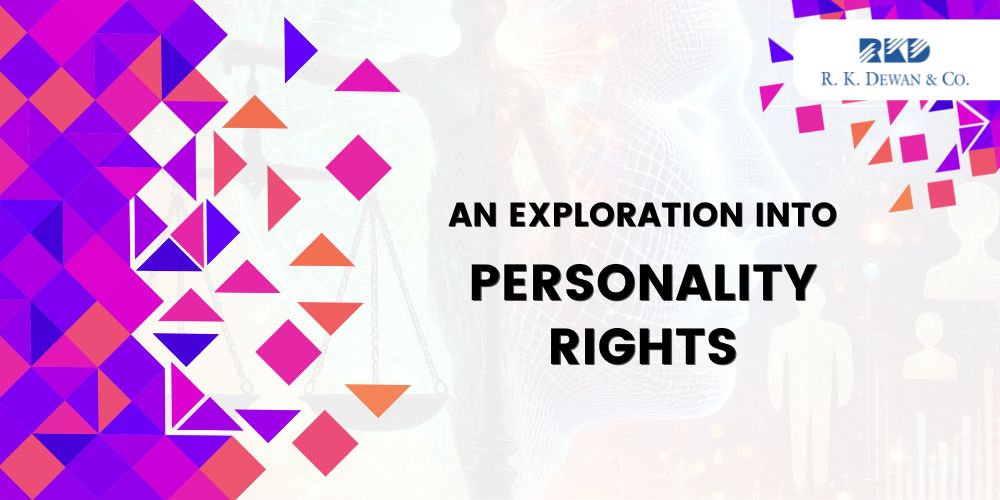“Over himself, over his own body and mind, the individual is sovereign.“
-John Stuart Mill
The importance of personal and intellectual autonomy, reinforcing the legal frameworks that empower individuals to maintain control over their identity and creative outputs cannot be highlighted enough.The intersection of technology and intellectual property law has become increasingly complex with the advent of AI-generated content. Scarlett Johansson’s dispute with OpenAI over the “Sky” voice feature which eerily resembles Scarlett’s voice from one of her movies titled, “Her”, highlight the increasing violations of personality rights of an individual and the pressing need for robust legal frameworks to protect personality rights. These rights encompass an individual’s control over the commercial use of their name, image, voice, and likeness, often referred to collectively as the “mark.”
Personality rights: The How, what and why
Personality rights simply put are rights that give individuals the power to control how their name, picture, likeness, or voice etc. is used. This enables individuals to stop others from using these personal details in ads, products, or other business activities without permission of the owner. An individual can gain the right of publicity through their association with an event, sport, movie, and similar activities. However, this right does not extend to the event that made the individual famous or to the corporation that organized the event. These rights are often associated with the broader right to privacy and are recognized through various legal frameworks and judicial pronouncements. However, it has been noticed that different jurisdictions have adopted varied approaches to personality rights. Some treat them as a single right covering both commercial and non-commercial aspects, while others view them as separate rights.
The Hon’ble Delhi High Court in the case of ICC Development (International) Ltd. v. Arvee Enterprises and Anr held that any effort to transfer the right of publicity from the individual to the event’s organizer (a non-human entity) would violate Articles 19 and 21 of the Constitution of India. No persona can be monopolized. The right of publicity belongs solely to the individual, who is entitled to benefit from it alone.
The evolution of personality rights, itself is fascinating. This right is not a new entrant into the society, its evolution spans centuries. Influential writings like “The Right to Privacy” by Samuel Warren and Louis Brandeis set the stage for the recognition of individuals’ rights to control their personal information and identity.
In the modern era, the commercialization of fame and the proliferation of mass media have propelled the concept of personality rights to the forefront of legal discourse. Celebrities’ names and images have become valuable commodities, prompting the establishment of legal frameworks to protect individuals’ control over their likeness and identity. This has led to the recognition of rights such as the right of publicity, empowering individuals to manage and profit from the commercial use of their persona. As we navigate the digital age, with its ubiquitous online presence and social media influence, the landscape of personality rights continues to evolve, presenting both new challenges and opportunities for legal protection in an increasingly interconnected world.
Indian perspective to personality rights
Personality rights in India are a relatively nascent and evolving legal concept. In the absence of any particular legal provision alluding to the same, they are still rooted in the broader domain of intellectual property and privacy laws, personality rights encompass the protection of an individual’s name, likeness, voice, signature, and other distinctive traits.
While there is no specific legislation solely dedicated to personality rights in India, various laws collectively contribute to their protection. The Copyright Act, 1957, protects the original expressions of individuals, indirectly safeguarding personality rights through control over creative works. The Trade Marks Act, 1999, allows individuals to register their name or signature as a trademark, securing exclusive rights to its commercial use. Additionally, the Indian Contract Act, 1872, enables individuals to enter into contracts to license or assign their personality rights.
The recognition and enforcement of personality rights in India have largely been shaped by judicial precedents rather than codified statutes. The Indian judiciary, drawing inspiration from common law jurisdictions like the United States and the United Kingdom, has progressively acknowledged the significance of these rights, particularly in the context of celebrities and public figures whose personas hold substantial commercial value. The right to privacy is a fundamental right in India, as established by the Supreme Court in the landmark case Justice K.S. Puttaswamy (Retd.) v. Union of India (2017). This ruling encompassed the right to control one’s personal information and identity, thereby laying the groundwork for personality rights.
In Titan Industries Ltd. v. Ramkumar Jewellers (2012), the Delhi High Court elucidated on the definition of a celebrity, highlighting the individual’s right to control the commercial use of their identity, famously coined as the right to publicity. Subsequently, in Amitabh Bachchan v. RajatNegi& Others, Mr. Bachchan successfully sought an injunction against the unauthorized use of his celebrity status to promote goods, emphasizing the practical application of personality rights in protecting against commercial exploitation. Similarly, in Shivaji Rao Gaikwad vs. Varsha Production, the Madras High Court restrained a production house from using Mr. Rajnikanth’s name, caricature, and dialogue style without permission, setting a precedent for the protection of celebrities’ persona and its commercial value.
Moreover, In the case of Anil Kapoor vs. Simply Life India and Ors., the Delhi High Court recognized the violation of personality rights in digital contexts, particularly through AI and virtual reality. The court emphasized the need for explicit legislation to protect personality rights in an increasingly technologically driven society.
However, the scope of posthumous personality rights in India has been subject to judicial scrutiny. The recent judgment in Krishna Kishore Singh Vs. Sarla A Saraogi&Ors. narrowed the ambit of posthumous personality rights, holding that the rights of privacy, publicity, and personality vested in Sushant Singh Rajput did not survive his death. This decision aligns with previous rulings, such as the Madras High Court’s decision in DeepaJayakumar vs A.L. Vijay, where the Hon’ble Court held that these rights cease with the individual’s life.
The evolution of personality rights in India reflects a significant stride towards recognizing and safeguarding individual autonomy and dignity. Despite the absence of specific legislative enactments dedicated solely to personality rights, the Indian legal system has drawn upon constitutional provisions, intellectual property laws, and judicial interpretations to establish and reinforce these crucial protections. Through landmark cases and judicial pronouncements, courts have affirmed the right of individuals to control the commercial use of their identity, ensuring that their names, images, likenesses, and voices are not exploited without consent. However, challenges remain, particularly in addressing posthumous personality rights and adapting to the complexities of the digital age. Moving forward, there is a pressing need for explicit legislation to comprehensively address personality rights in an era marked by rapid technological advancements and evolving societal norms. By providing clear legal frameworks and protections, India can further strengthen individual autonomy and uphold the inherent dignity of every person.


